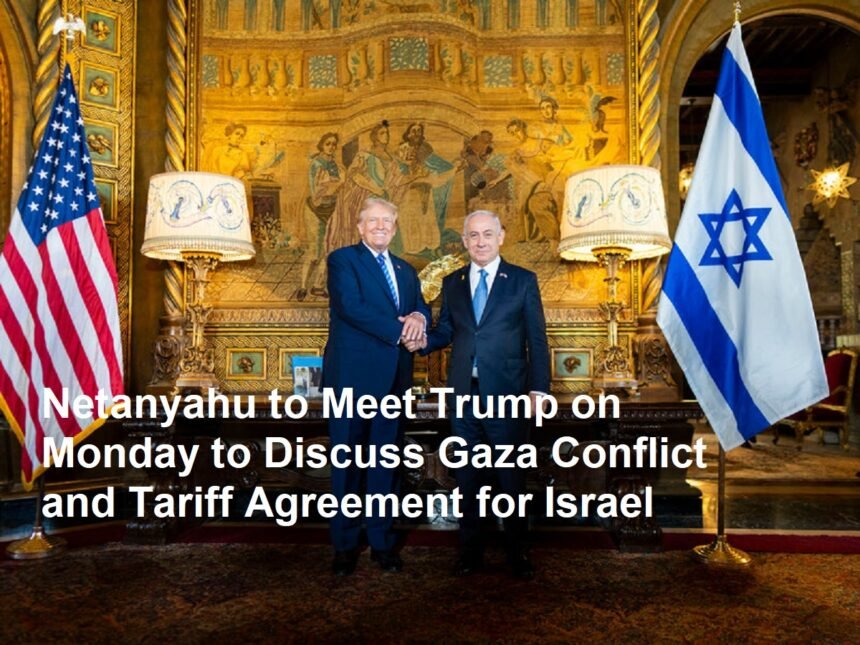In a high-stakes diplomatic development, Israeli Prime Minister Benjamin Netanyahu is set to meet with U.S. President Donald Trump on Monday, April 7, 2025. The scheduled talks, held at the White House, are expected to cover a wide range of issues—from the ongoing conflict in Gaza to a potential tariff agreement designed to bolster Israel’s economic interests. This meeting comes at a time when both nations are navigating complex regional and economic challenges.
The discussions are anticipated to center on the escalating war in Gaza, a conflict that has drawn international attention and concern. Recent hostilities have further destabilized an already volatile situation in the region, and both leaders have expressed a mutual desire to secure a cessation of violence and initiate a dialogue aimed at long-term peace. Netanyahu, whose government has been under intense pressure to curb the conflict, is expected to outline Israel’s security concerns and the steps his administration is taking to safeguard its citizens. President Trump, known for his assertive stance on international conflicts, has repeatedly emphasized the importance of American support for Israel, a commitment that remains a cornerstone of U.S. foreign policy in the Middle East.
Amid the discussions on security, another critical agenda item is the proposed tariff agreement for Israel. The new trade measures, which have been in preliminary negotiations for several months, aim to provide Israel with preferential tariff terms. These tariffs are seen as a means to boost Israel’s export-driven economy, particularly in the technology and defense sectors, which are vital to the nation’s economic growth. For Netanyahu, securing this agreement is not only a matter of economic policy but also a strategic move to further strengthen bilateral ties with the United States.
Political analysts note that the meeting between Netanyahu and Trump is significant on multiple levels. “This is a crucial juncture for both Israel and the U.S.,” commented a senior diplomat familiar with the negotiations. “The leaders are working to ensure that their respective national interests are met in both security and economic terms, while also sending a signal to the international community that they remain united in the face of regional instability.”
The proposed tariff deal has been under discussion amid concerns about global trade dynamics and the shifting balance of economic power. Supporters argue that the agreement could provide Israel with enhanced market access and economic leverage, which in turn would contribute to regional stability by promoting growth and reducing reliance on external aid. However, critics caution that the deal could also complicate U.S. relations with other key trading partners in the region if not carefully negotiated.
During Monday’s meeting, it is expected that both leaders will also address broader strategic concerns. With tensions in Gaza threatening to spill over into wider regional conflicts, the discussion is likely to include measures to prevent further escalation and to explore avenues for peace. The two leaders are expected to review recent developments on the ground, assess humanitarian challenges, and consider collaborative efforts to restore calm. “Our objective must be to ensure security for our people while paving the way for sustainable peace,” stated a senior advisor from Netanyahu’s office, hinting at the potential for renewed negotiations with Palestinian representatives under a more favorable framework.
The White House has underscored the importance of this bilateral meeting, with Trump’s administration highlighting its commitment to Israel’s security and economic well-being. Meanwhile, Netanyahu’s visit is seen as an opportunity to reinforce Israel’s strategic alliances at a time when regional dynamics are increasingly unpredictable. Observers believe that the outcome of these discussions could have far-reaching implications for the balance of power in the Middle East and for international trade policies in the coming years.
As both nations prepare for the meeting, the international community watches closely, hopeful that these high-level talks will contribute to a reduction in hostilities and promote a framework for economic cooperation that benefits both Israel and the United States. The world awaits Monday’s discussions, anticipating decisive actions that may shape the region’s future trajectory.












